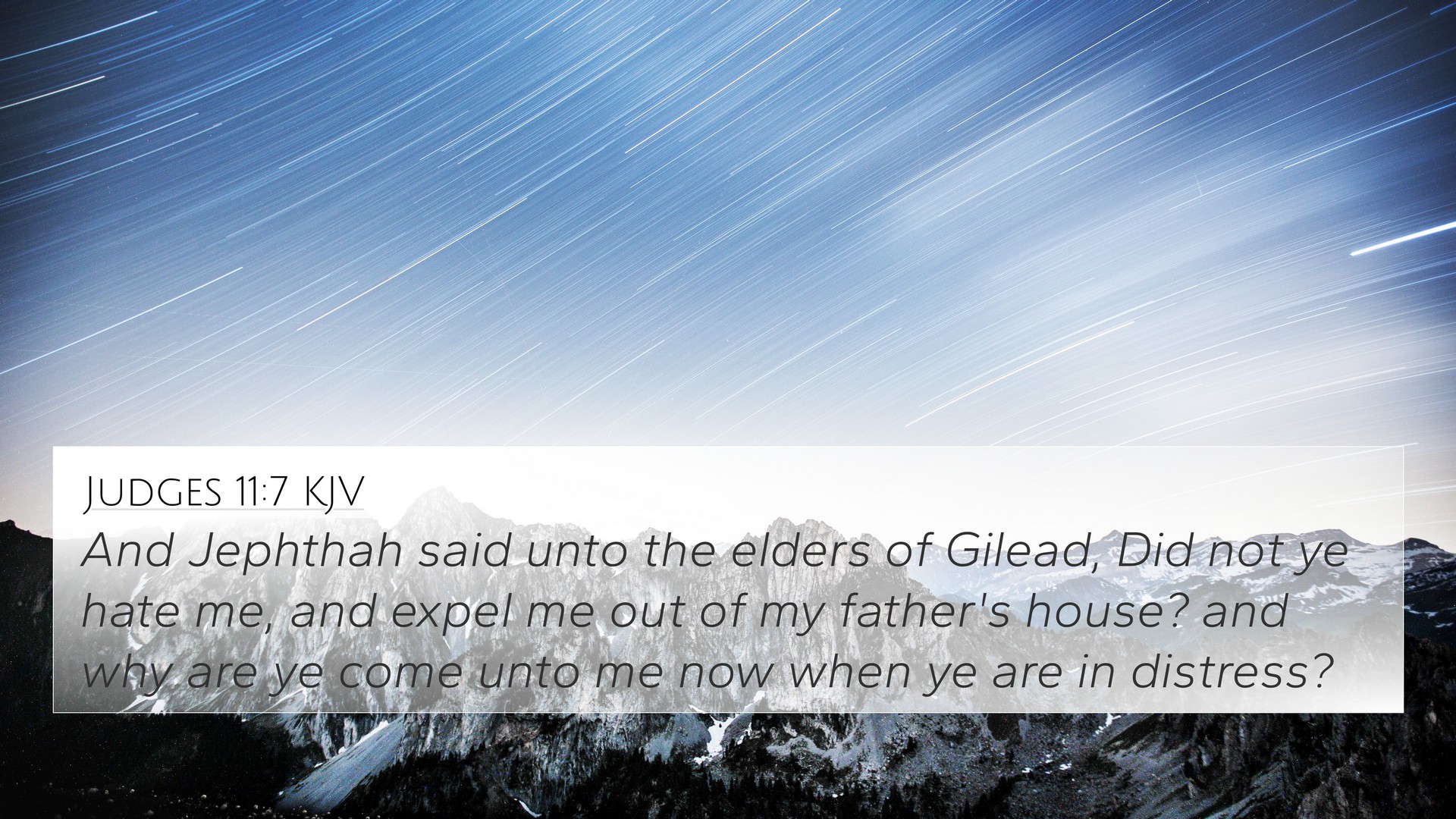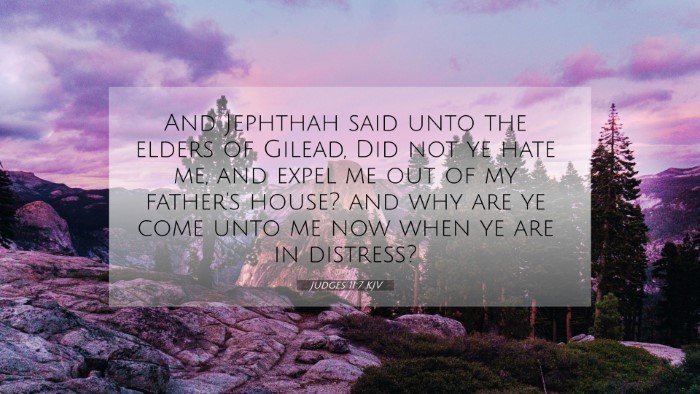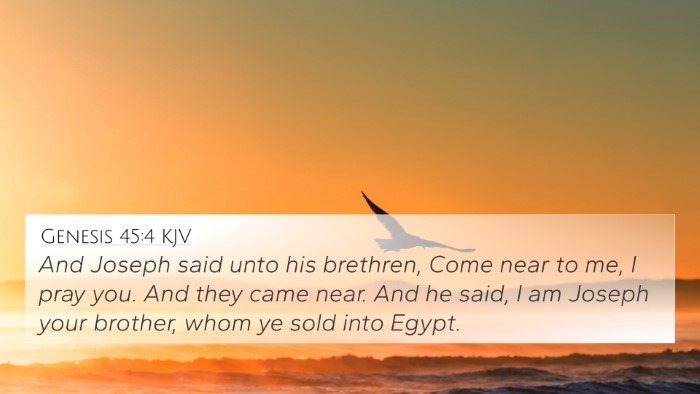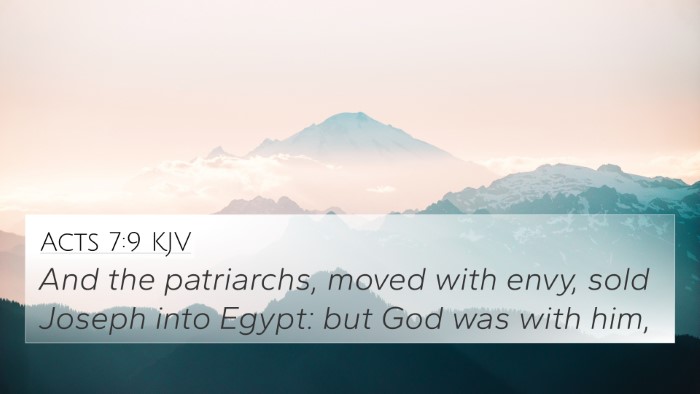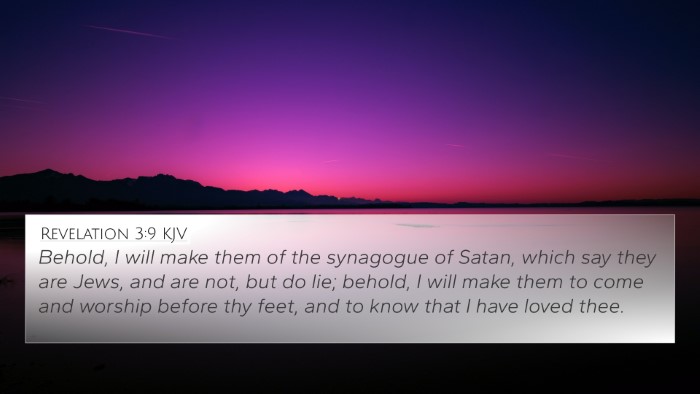Understanding Judges 11:7
Bible Verse: Judges 11:7
In Judges 11:7, we see a pivotal moment in the narrative surrounding Jephthah, where he addresses his past and the rejection he faced from his family and people. This verse serves as a critical insight into Jephthah's character and the challenges he overcame.
Summary of the Verse
Jephthah responds to the leaders of Gilead who previously cast him out due to his illegitimate birth and now seek his help against the Ammonites. His declaration emphasizes the connection between personal experience and communal need, highlighting a theme of redemption and leadership.
Commentary Insights
-
Matthew Henry's Commentary:
Matthew Henry infers that Jephthah’s experience of being ostracized due to his lineage made him a more empathetic leader. His rejection became a catalyst for validation in his role as a warrior for Israel. This reflects how God often uses the overlooked and marginalized to fulfill His purposes.
-
Albert Barnes' Notes:
Barnes emphasizes the significance of Jephthah's rhetorical question about their earlier rejection of him. This question serves as a reminder of their inconsistency, showcasing how the very people who dismissed him now seek his aid. It underscores the biblical principle of humility and divine elevation.
-
Adam Clarke’s Commentary:
Clarke explores the cultural context of Jephthah’s status as a son of a harlot and how this shaped his interactions with both his peers and the Ammonites. He points out that Jephthah's address reflects the complexities of leadership amidst societal prejudices, shedding light on the human condition that God still works through.
Bible Verse Cross-References
- Hebrews 11:32-34: Jephthah is mentioned as a man of faith in the hall of fame of faith, showcasing his significance in God’s plan.
- Judges 10:6-9: Context about the failure of Israel leading to God allowing oppression, setting the stage for Jephthah’s rise.
- Luke 20:9-16: Parable of the wicked vinedressers resonates with themes of rejection and responsibility.
- 1 Samuel 16:7: God choosing David based on the heart rather than appearance draws parallels with Jephthah’s choices.
- Romans 8:28: God works all things for the good of those who love Him connects with the essence of Jephthah’s story.
- Jeremiah 1:5: God selecting individuals for specific purposes fulfills in Jephthah's calling regardless of his past.
- 1 Corinthians 1:27: God chooses the foolish things to confound the wise mirrors Jephthah’s ascent from rejection.
Thematic Bible Verse Connections
Judges 11:7 connects to numerous themes in scripture about leadership, rejection, restoration, and the sovereignty of God. Jephthah’s journey from being cast out to a revered leader embodies these principles. His encounter with the leaders of Gilead illustrates how personal hurt and communal crises can lead to unforeseen redemptive paths.
Exploring Inter-Biblical Dialogues
Jephthah's story invites comparisons with other Biblical figures who faced rejection but achieved great things by God’s design. For instance:
- Moses: Rejected by his people, later becomes their leader (Exodus 2).
- David: Once underestimated, later chosen as king (1 Samuel 16).
- Esther: Initially an orphan, rises to save her people (Esther 4).
Conclusion
Judges 11:7 serves not only as a historical account but as a source of inspiration and reflection on the way God operates through human circumstances. The various commentaries enrich our understanding and reveal the deeper spiritual connections that this verse offers, making it a profound study for anyone seeking a more comprehensive knowledge of Biblical texts.
Tools for Bible Cross-Referencing
For those interested in exploring these connections further, various tools and methods can aid in your study:
- Bible Concordance: A useful tool for locating scripture based on specific words or themes.
- Bible Cross-Reference Guide: Provides a systematic way to find related verses.
- Cross-Reference Bible Study: Engaging with various passages to detect themes and messages.
Further Study Suggestions
To deepen your understanding, consider:
- Investigating Bible verses related to leadership and their context across different books.
- Engaging in a Comparative study of Pauline epistles addressing themes of rejection and redemption.
- Exploring how Jephthah's narrative relates to themes in the Gospels, especially concerning grace and acceptance.
